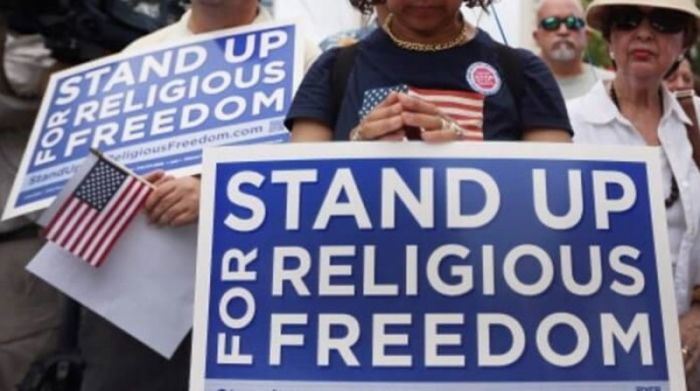The Candy Cane Case, Shoe Boxes and Threats to Religious Liberty

Hostility toward religion has been increasing over the years, and it is important that parents, teachers, and students know their rights. Here are a few representative examples of cases in the public schools that garnered national attention. There are many others like it that didn't get as much publicity.
The Candy Cane Case
One legal case came from a public elementary school in Plano, Texas. The school held a "Winter Party" for its students. Notice that it wasn't called a "Christmas party" because that would be perceived as politically incorrect. Nevertheless the students were allowed to bring gifts that they could share with their classmates.
One of the students (named Jonathan) brought candy canes with a poem attached to them that mentioned the name "Jesus." Jonathan was singled out by the teacher and told he could not pass out those candy canes. The principal reinforced the decision citing the "separation of church and state."
Other children were banned from distributing pencils to friends because the word "God" was on the pencils. And one whole class that was writing to soldiers in Iraq was prohibited from writing "Merry Christmas" to the soldiers.
Liberty Institute eventually had to bring a court case because the school district would not budge. In fact, it spent hundreds of thousands of dollars to argue against Christian students having the right to distribute candy canes or pencils that would be perceived as religious.
Why did they go to such lengths? We don't have to guess since they stated in their legal documents that they believed the students are too young to have First Amendment rights. They also said that neither the students nor the parents should be able to challenge their administrative decisions.
Graduation Ceremonies
You would think that students would have some First Amendment freedom especially when it came to speeches they would give at a high school graduation. Consider the case of valedictorian Angela Hildenbrand who planned to offer a short prayer during her speech. A U.S. District Judge issued a temporary restraining order prohibiting the school's "invocation" and "benediction." The judge also threatened to jail anyone who disobeyed the order. Fortunately, the Fifth Circuit Court overturned the judge's order hours before Angela was to give her speech.
Football Banners
Cheerleaders in the town of Kountze, Texas decided to put Bible verses on the banners that the football team runs through at the start of the game. Although most fans appreciated the positive messages, the school stopped them because it received a threatening demand letter from the Freedom From Religion Foundation. The Kountze superintendent banned the practice of putting the verses on the banners.
Liberty Institute and their local attorney obtained a temporary injunction, allowing the student-written banners to continue. That began a lengthy process of hearings, motions, and pleadings. The students had to endure hours of questioning in depositions.
This issue should never have been controversial. The decision to display Bible verses was the decision of the students. The girls used their own material. They alone decided what verses to paint on the banners.
In the end, the students were victorious. The judge ruled that the "banners that included religious messages and were displayed during the 2012 football season were constitutionally permissible." He went on to argue that: "Neither the Establishment Clause not any other law prohibits the cheerleaders from using religious-themed banners at school sporting events."
The victory was possible because of the involvement of Liberty Institute, the local attorney, and the Texas Attorney General. But it is worth noting that it was also possible because of the cheerleaders who didn't back down and stood for their religious rights.
Controversial Shoe Boxes
Apparently teaching school children to give to other less fortunate children became controversial because the organization providing the opportunity was religious. Operation Christmas Child is organized by Samaritan's Purse. Students were allowed to pack a shoebox with a few small toys and lots of essentials (school supplies and hygiene products). Samaritan's Purse encloses a story about Jesus and then sends it to needy children all over the world.
Public schools (from South Carolina to Colorado) were under attack from the American Humanist Association. Their threatening letter demanded "that the school terminate all promotion, sponsorship, endorsement or affiliation with Operation Christmas Child immediately."
The humanists argued that allowing students to participate in this program violates the First Amendment. That would be the First Amendment that says: "Congress shall make no law respecting an establishment of religion, or prohibiting the free exercise thereof." The First Amendment provides for the freedom OF religion. These humanists instead wanted to argue that the First Amendment should provide them freedom FROM religion.
Although the schools backed down, parents in some schools stepped up. They were determined to make the Operation Christmas Child the largest drive ever. These parents put out a notice for the children to bring the shoeboxes to locations other than the school. The kindness of these students will bless other needy children. Unfortunately, the students in the rest of the schools learned the false lesson that sending a shoebox of toys and essentials is unconstitutional.
Christian Teacher Suspended
Teachers also face threats to their religious liberty. One famous case involved John Freshwater. He was a science teacher in Ohio who even received a Teacher of the Year award. He had his Living Bible on his desk for 21 years, but it was not in a prominent place.
When I interviewed him, he did mention that he decided to follow some of the details in the "No Child Left Behind" legislation that allowed teachers to teach the controversy concerning evolution. He wonders if his willingness to talk about the problems with evolution is part of the reason for actions against him. Nevertheless, he was suspended without pay. After a hearing the school the board terminated his teaching contract.




























